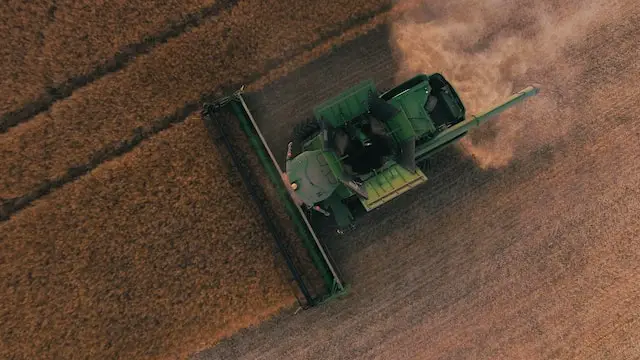Farmers in Arkansas can benefit from tax exemptions that can help reduce their expenses. To qualify for a farm tax exemption in Arkansas, farmers must meet certain conditions.
The Arkansas Department of Agriculture provides information on how to obtain a farm tax exempt number and the requirements for eligibility.
To qualify for a farm tax exemption in Arkansas, farmers must be engaged in the production of food, fiber, grass sod, or nursery items as a business.
They must also purchase an item of farm machinery or equipment. The Arkansas Department of Agriculture provides a farm tax exempt number to farmers who meet these requirements.
This number is used when purchasing qualifying items to avoid paying sales tax.
Farmers who obtain a farm tax exempt number can benefit from reduced expenses on farm equipment and machinery purchases.
The Arkansas Department of Agriculture provides information on how to apply for a farm tax exempt number and the requirements for eligibility.
By obtaining a farm tax exempt number, farmers can save money and invest in their agricultural business.

Overview of Farm Tax Exemption in Arkansas
Farmers in Arkansas are eligible for tax exemptions on their agricultural purchases.
The state provides several exemptions to farmers to support their agricultural activities, including sales tax exemption, use tax exemption, and property tax exemption.
Sales Tax Exemption
Arkansas Code Ann. §26-52-403 provides a sales tax exemption for new and used farm machinery and equipment used exclusively and directly for the agricultural production of food or fiber as a commercial business.
However, it’s important to note that sometimes, purchasers improperly claim the exemption.
Use Tax Exemption
In addition to sales tax exemption, farmers in Arkansas are also eligible for use tax exemption. Use tax is a tax on the use, storage, or consumption of tangible personal property in Arkansas.
Farmers can claim use tax exemption on their purchases of farm machinery and equipment, breeding livestock, and other tangible personal property used exclusively and directly for the commercial production of food or fiber.

Property Tax Exemption
Farmers in Arkansas can also benefit from property tax exemption. The state provides a property tax exemption for agricultural land used for commercial agricultural purposes.
The exemption applies to the assessed value of the land, but not to the value of any improvements on the land.
IRS Tax Exemption
Farmers in Arkansas can also apply for tax-exempt status with the IRS. To be eligible, the farm must operate as a nonprofit organization and meet the IRS’s requirements for tax-exempt status.
In conclusion, farmers in Arkansas can benefit from several tax exemptions to support their agricultural activities. The state provides sales tax exemption, use tax exemption, and property tax exemption, while the IRS offers tax-exempt status for nonprofit farms.
Qualifying for Farm Tax Exemption
To qualify for farm tax exemption in Arkansas, certain conditions must be met. This section will outline the requirements for agricultural land, qualifying agricultural activities, and the types of farms that qualify.
Requirements for Agricultural Land
In order to qualify for farm tax exemption, the land must be classified as agricultural land. Agricultural land is defined as land used for the production of crops, livestock, or timber.
This includes land used for commercial aquaculture, horticulture, floriculture, and viticulture. The land must also be used for a qualifying agricultural activity.

Qualifying Agricultural Activities
The following activities are considered qualifying agricultural activities in Arkansas:
- Production of food, fiber, or nursery items as a business
- Production of livestock or poultry
- Production of fish or aquatic plants
- Production of timber or other forest products
- Operation of a feedlot, dairy, ranch, or plantation
- Operation of a commercial horse boarding facility
Types of Farms that Qualify
To qualify for farm tax exemption, the farm must be engaged in a qualifying agricultural activity as a business. This means that the farm must be operated with the intent to make a profit. The following types of farms may qualify for exemption:
- Crop farms
- Livestock farms
- Poultry farms
- Fish farms
- Nursery or greenhouse operations
- Timber farms
It is important to note that not all farms may qualify for exemption. For example, a farm that is used solely for personal use or as a hobby farm may not qualify. Additionally, farms that are used for non-agricultural purposes, such as hunting or recreational purposes, may not qualify.
In order to apply for farm tax exemption in Arkansas, a certificate of exemption must be obtained. This certificate must be presented to the seller at the time of purchase in order to receive the exemption.
Applying for Farm Tax Exemption
Farmers in Arkansas can apply for a tax exemption to reduce their sales and use tax burden. The exemption applies to purchases of farm machinery, equipment, and other items used exclusively for agricultural purposes. To apply for the exemption, farmers must follow a specific process and provide required documentation.
Application Process
To apply for a farm tax exemption in Arkansas, farmers must fill out and submit the ST391 Arkansas Sales Tax Exemption Certificate form. The form can be downloaded from the Arkansas Department of Finance and Administration website or requested by mail.
Farmers must include their Arkansas Sales/Use Tax Permit Number or the state and Sales Tax Number if the buyer is from another state. The form must be completed accurately and signed by the farmer or authorized agent.
Required Documentation
Along with the completed ST391 form, farmers must provide documentation that proves their eligibility for the tax exemption. Required documentation may include:
- A copy of the farmer’s Arkansas Sales/Use Tax Permit
- Proof of ownership or lease of the farm property
- A list of the farm machinery and equipment to be exempted
- Proof of purchase or lease of the exempted items
Deadlines and Renewals
Farmers must apply for the tax exemption before making any purchases of farm machinery, equipment, or other items. The exemption is valid for one year and must be renewed annually by submitting a new ST391 form and required documentation.
The deadline for submitting the renewal application is the last day of the month in which the original exemption was granted. Failure to renew the exemption on time will result in the farmer being charged sales and use tax on their purchases.
Appealing a Denied Application
If a farmer’s application for a farm tax exemption is denied, they may appeal the decision by filing a written protest with the Arkansas Department of Finance and Administration within 30 days of receiving the notice of denial. The protest must include a detailed explanation of the reasons for the appeal and any supporting documentation.
The Department will review the appeal and issue a final decision within 60 days. If the farmer disagrees with the decision, they may file a petition for review with the Arkansas Tax Court within 30 days of the final decision.
Benefits of Farm Tax Exemption
In Arkansas, obtaining a farm tax exemption can provide significant benefits for farmers. Here are some of the advantages of having a farm tax exemption:
Reduced Expenses
Farmers with a tax exemption can save money on expenses associated with their agricultural operations. These savings can be substantial, as they include sales tax exemptions on farm machinery and equipment, feed, seed, and fertilizer. Additionally, farmers can receive property tax exemptions on their farmland and buildings, which can provide significant savings over time.
Access to Credit
Farmers with a tax exemption may have an easier time obtaining credit from lenders. Lenders may be more willing to lend money to farmers who have a tax exemption because they see them as less of a financial risk. This can be especially beneficial for new farmers who are just starting out and need access to capital to purchase equipment and other necessary items.
Research and Development
Farmers with a tax exemption may have access to research and development programs that are not available to non-exempt farmers. These programs can help farmers improve their operations by providing access to new technologies, techniques, and practices. This can lead to increased productivity, higher yields, and improved profitability.
Hobby Farming
Farmers who engage in hobby farming can also benefit from a tax exemption. Hobby farmers can receive a tax exemption if they meet certain criteria, such as generating a minimum amount of income from their agricultural operations. This can provide hobby farmers with a financial incentive to continue their operations, even if they are not generating significant profits.
Overall, obtaining a farm tax exemption can provide significant benefits for farmers in Arkansas. From reduced expenses to access to credit and research and development programs, a tax exemption can help farmers improve their operations and achieve greater success.
